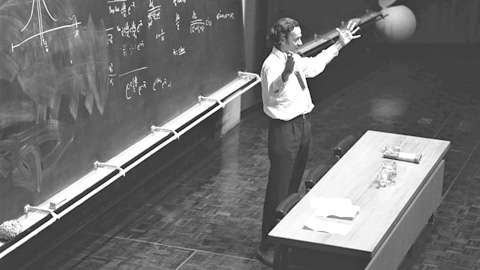David Kaiser, physicist and science historian at MIT, to talk about Richard Feynman at the UAB

07/05/2018
In commemoration of the birth centennial of physicist Richard P. Feynman on 11 May 1918, this year numerous activities are being held all over the world. Among them is the conference which will be offered by David Kaiser, physicist and science historian at MIT, on 9 May at 12 noon at the conference hall of the Faculty of Sciences, entitled "Following his own path: The Life and Science of Physicist Richard Feynman". The activity is part of a programme organised by the nanoscience and nanotechnology communication and dissemination group of the Catalan Association of Scientific Communication "EspaiNano".
The presentation will provide an introduction to the most important scientific contributions of "one of the most creative and influential physicists of the 20th century", according to Kaiser, who will place his efforts within the wider context of his life and time. Some of Feynman's formative experiences came during World War II, when he participated in the Los Alamos Laboratory of the Manhattan Project. After the war, Feynman completed a series of works that changed forever how physicists think about the natural world, from the "strange dance of quantum particles" to the mysterious behaviour of nuclear forces, extending even to the structure of space and time themselves. Famous for his engaging lecture style, Feynman became a renowned textbook author and popular writer as well.
David Kaiser is Germeshausen Professor of the History of Science and Professor of Physics at the Massachusetts Institute of Technology. His award-winning books include 'Drawing Theories Apart: The Dispersion of Feynman diagrams in Postwar Physics' (2005), which traces how Richard Feynman's idiosyncratic approach to quantum theory became mainstream, and 'How the Hippies Saved Physics: Science, Counterculture, and the Quantum Revival' (2011), which focuses on physicists' efforts to understand strange phenomena like quantum entanglement. He co-directs a research group in early-universe cosmology within MIT's Center for Theoretical Physics, and also helps to lead an international collaboration conducting new experiments to explore the foundations of quantum theory. A Fellow of the American Physical Society, Dr Kaiser has received MIT's highest awards for excellence in teaching. His work has been featured in Science, Nature, the New York Times, and the New Yorker magazine, as well as on NOVA television programs, National Public Radio, and the BBC.
For more information please visit:
web.mit.edu/dikaiser/www/
feynmantotal.cat